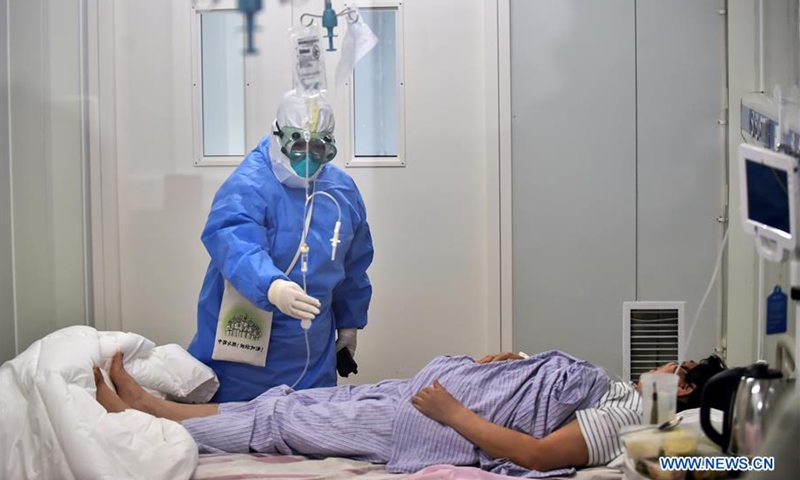Beijing reports one confirmed COVID-19 case who previously tested positive for viral antibodies
By Liu Caiyu Source: Global Times Published: 2020/10/20 14:20:24

A nurse treats a COVID-19 patient at an isolation ward in Beijing Ditan Hospital in Beijing, capital of China, June 16, 2020. (Xinhua/Peng Ziyang)
Beijing reported one confirmed imported case of COVID-19 on Monday who had tested negative multiple times and at the same time also tested positive for novel coronavirus antibodies.
Virologists reached by the Global Times on Tuesday said that based on the information released, this is not a typical case and not a secondary infection case, adding that inaccurate testing kits cannot be ruled out.
The patient, a 27-year-old Chinese student from Northwest China's Xinjiang Uyghur Autonomous Region, had entered Beijing from Jordan via Istanbul in Turkey and Copenhagen in Denmark on October 13 and showed symptoms of fever and headache on October 14. After taking multiple nucleic acid tests since that day, her results came back negative, but in one test she tested positive for novel coronavirus antibodies.
The nucleic acid tests on October 15 were based on her pharyngeal swabs, nasopharyngeal swabs, anal swabs and sputum specimens, said Pang Xinghuo, a deputy director of Beijing's municipal center for disease prevention and control, at a press conference on Tuesday.
Later on October 19, the woman tested positive for the novel coronavirus in her deep cough sputum specimen and showed infection symptoms in her lung CT scans. She was confirmed to have been infected with COVID-19 on Monday.
Jin Dongyan, a biomedical professor at the University of Hong Kong, told the Global Times on Tuesday that this case is not typical. Generally speaking, the viral load should be relatively high during fever, but the virus was not detected in this patient in the first few days. Positive antibody results generally appear after positive nucleic acid tests, but her case showed the opposite.
Her viral infection area may be located in the lower respiratory tract, making it difficult to carry out initial nucleic acid tests, which is why a negative nucleic acid test result was returned, Jin said.
Jin said that her case doesn't seem to be one of reinfection either. If the patient was already infected, her positive antibody test meant she should have immunity against the novel coronavirus. The protective effect of antibodies against coronaviruses normally lasts about months, and she could not be infected in such a short period of time, experts said.
Yang Zhanqiu, a Wuhan-based virologist, attributed the abnormal nucleic acid and antibody testing results to inaccurate testing kits.
Her complete medical records should be viewed before coming to any final conclusion, Jin said, adding that the case is rare but possible, as there have been similar cases in other countries.
Chinese experts had said the antibody against the novel coronavirus will decay, and the speed of decrease may be faster than expected, after Hong Kong reported the world's first confirmed case of a human becoming reinfected after recovery in August.
In wake of Qingdao COVID-19 outbreak, Beijing has demanded 11,000 hospitals to conduct cross checks relating to virus, closing loopholes in hospital-acquired infections. Shared use CT, X-rays and B-ultrasound facilities between COVID-19 and general patients will be targeted, Beijing officials said on Tuesday.
Pang suggested that students studying abroad reduce their outdoor activities and try to avoid transferring in international flights in order to lower the risk of infection during travel.
Posted in: SOCIETY